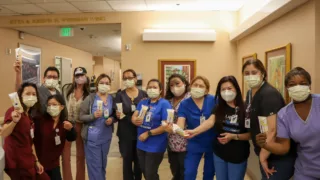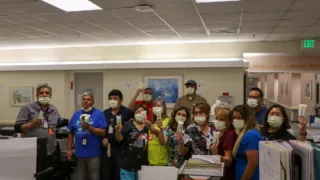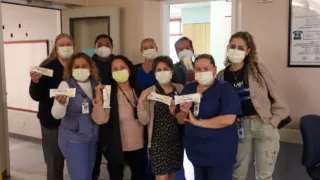National Rankings Highlight Excellence at Los Angeles Jewish Health


National Rankings Highlight Excellence at Los Angeles Jewish Health
In the world of senior care, there are multiple measures of success. Maintaining seniors’ health and improving their quality of life are the most obvious markers, and in these arenas, Los Angeles Jewish Health (LAJH) is a leading care provider on the national stage.
A recently released national report is further testament to LAJH’s commitment to providing the highest levels of care. The Centers for Medicare and Medicaid Services (CMS), a federal agency within the US Department of Health and Human Services that administers the Medicare program, has published its latest round of data evaluating the quality of care provided by skilled nursing facilities. Among CMS’ findings: When it comes to avoiding hospital readmissions, Los Angeles Jewish Health’s Mark Taper Skilled Nursing Building received a number one ranking out of more than 15,000 skilled nursing facilities in the United States (according to the Kaiser Family Foundation, there are 15,183 such facilities nationwide), and the Joyce Eisenberg Keefer Medical Center is approximately the 80th percentile.
These numbers are calculated as part of CMS’ Skilled Nursing Facility Value-Based Purchasing (SNF VBP) Program, which examines all-cause hospital readmissions on an annual basis and awards incentive payments to those facilities whose readmission rates remain low. In other words, facilities are recognized and rewarded for providing high level care that keeps readmission to hospitals lower. Those financial rewards can then be reinvested in the facilities to continue enhancing quality of care – and, ultimately, to further reduce readmissions.
“We’re incredibly proud of these best-in-class results, which are made possible by the dedication and expertise of our Los Angeles Jewish Health staff,” says Timothy Carlson, chief nursing officer for Los Angeles Jewish Health. “Through the early detection and management of changes in condition, the provision of high-quality care, and strong communication and coordination with community-based physicians, we are able to help Southern California seniors thrive.”
LAJH facilities were not the only ones to be recognized by SNF VPB for exceptional performance. “During the CMS evaluation, skilled nursing facilities garner points, between one and 100. All facilities that receive 100 points get the top distinction,” Carlson says, meaning Taper was one of numerous facilities to earn a number one ranking.
Still, this achievement places LAJH in rarefied company alongside the nation’s other very best senior healthcare services.
“These numbers make it clear that Los Angeles Jewish Health is a central destination for extraordinary senior care,” Carlson says. “We are committed to continuing that excellence in the months and years to come.”


